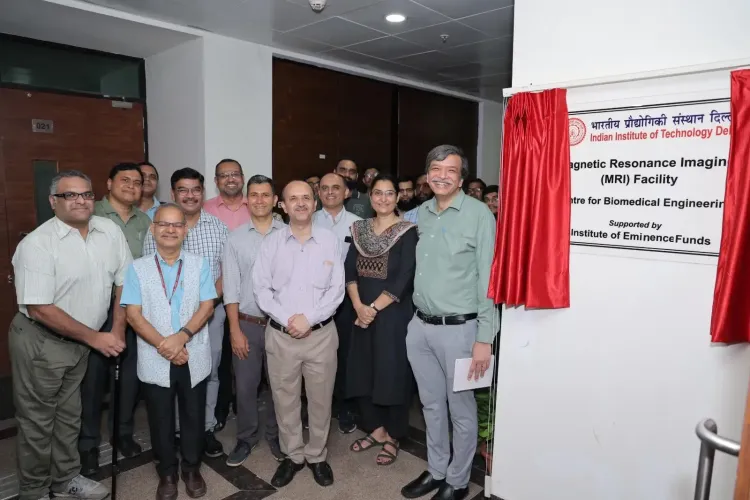Has IIT Delhi Launched an MRI Research Facility to Drive Medical Imaging Innovation?

Synopsis
Key Takeaways
- State-of-the-art MRI facility launched at IIT Delhi.
- Focus on innovative medical imaging research.
- Equipped with a 1.5 Tesla MRI scanner.
- Supports interdisciplinary collaborations in healthcare.
- Enhances practical training for medical imaging students.
New Delhi, July 12 (NationPress) The Indian Institute of Technology Delhi (IIT Delhi) has officially unveiled a state-of-the-art Magnetic Resonance Imaging (MRI) research facility aimed at enhancing innovations in the realm of medical imaging.
Established under the Institute of Eminence (IoE) initiative, this facility boasts a 1.5 Tesla clinical-grade MRI scanner.
It stands as the first of its kind among India’s premier engineering and technology institutions, focusing exclusively on research and education.
In contrast to traditional MRI installations typically found in hospitals, this facility is structured to promote limitless innovation in medical imaging, with a key emphasis on MRI technology.
The facility will facilitate pioneering research across various applications in MR imaging, including the creation of new contrast agents, acquisition sequences, optimization of imaging protocols, development of MR-compatible devices, and the incorporation of artificial intelligence in image processing.
“This new MRI research facility will significantly contribute to research and innovation in imaging, supporting IIT Delhi’s mission to generate new knowledge at the intersection of science, engineering, and medicine, ultimately impacting healthcare,” stated Prof. Rangan Banerjee, Director of IIT Delhi.
Situated within the Centre for Biomedical Engineering (CBME) at IIT Delhi, the facility will initially support research using phantoms and, pending regulatory approvals, will expand to encompass clinical studies with volunteers.
Moreover, it will act as a practical training ground for students enrolled in medical imaging courses at IIT Delhi, enhancing their exposure to advanced imaging technologies.
According to Prof. Anup Singh and Prof. Amit Mehndiratta from CBME, the vision for this facility was conceived five years ago.
The establishment of this facility will provide a novel perspective to teaching and learning in medical imaging at the university.
Initiated on July 9, the first MRI safety session was conducted by B-MEC Imaging Pvt. Ltd., the company responsible for installing the MRI scanner.
“This advanced imaging facility will benefit numerous researchers from diverse fields at IIT Delhi and will also create opportunities for research collaborations with medical institutions in NCR and throughout India,” expressed Prof. Vivek Buwa, Dean of Planning, IIT Delhi.









